|
|
|
Sort Order |
|
|
|
Items / Page
|
|
|
|
|
|
|
| Srl | Item |
| 1 |
ID:
116110
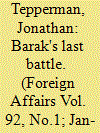

|
|
|
|
|
| Publication |
2013.
|
| Summary/Abstract |
Ehud Barak is one of Israel's most important leaders -- and also one of its most enigmatic and controversial. As defense minister in the current government, Barak prosecuted the November Gaza campaign, handles the Palestinian brief, and, along with Prime Minister Benjamin Netanyahu, gets the last word on whether to attack Iran -- Israel's most pressing security concern despite the recent focus on Hamas. Given the pariah status of Israel's foreign minister, Avigdor Lieberman, Barak, a frequent presence in Washington, essentially covers that portfolio as well. Yet despite 35 years of military service and more than a decade in public life, Barak remains something of a cipher -- a man one of Israel's leading columnists, Ari Shavit, compares to a stealth bomber ("the usual radar doesn't capture him"). "I don't know anyone more difficult to read," Shavit says.
|
|
|
|
|
|
|
|
|
|
|
|
|
|
|
|
| 2 |
ID:
167955
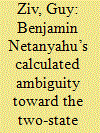

|
|
|
|
|
| Summary/Abstract |
GUY ZIV analyzes the case of Israeli Prime Minister Benjamin Netanyahu’s endorsement of the two-state solution to the Israeli-Palestinian conflict. He argues that Netanyahu’s June 2009 declaration was a tactical maneuver rather than a reassessment of his beliefs.
|
|
|
|
|
|
|
|
|
|
|
|
|
|
|
|
| 3 |
ID:
170702
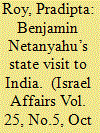

|
|
|
|
|
| Summary/Abstract |
A six-day visit by PM Benjamin Netanyahu to India on 14–19 January 2018 marked a new apogee in the renewed relationship between two old civilizations. It was a reciprocal visit to PM Narendra Modi’s visit to Israel in July 2017 to celebrate the Silver Jubilee year of the ‘Diplomatic Normalisation’ between the two states. Netanyahu’s visit took place not only against the backdrop of this enthusiasm, but also had concrete economic and political goals given that just a month before the visit New Delhi cancelled a $500 arms deal with Israel and voted against the Jewish state in the UNGA on the Jerusalem question. Through five public addresses, three media interviews and one road show, Netanyahu attempted to break longstanding anti-Israel stereotypes and show the Indian masses that they could be beneficiaries of Israel’s innovation and technological advancement. Amplified by a string of economic, high-tech, agricultural, and defence agreements, Netanyahu’s visit proved to be a success, whose positive implications will affect the bilateral relations for years to come.
|
|
|
|
|
|
|
|
|
|
|
|
|
|
|
|
| 4 |
ID:
097103
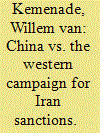

|
|
|
|
|
| Publication |
2010.
|
| Summary/Abstract |
The EU, Israel, and United States have been conducting an intensive campaign of diplomatic skirmishes with Brazil, China, Turkey, and others over imposing sanctions on Iran to stop it from moving from enriching uranium to building nuclear weapons. The sanctions needed to be "crippling" according to U.S. Secretary of State Hillary Rodham Clinton, "massive" according to President Nicolas Sarkozy of France, and "biting" according to Prime Minister Benjamin Netanyahu of Israel.1 Yet, an operational consensus had not been obtained by May 2010. Some in the United States, particularly within Congress, appear willing to be indiscriminate in hitting not only the core of the Iranian regime but also the Iranian people, while Israel is defiantly planning a potentially catastrophic military attack on Iran's nuclear sites even without the consent of the United States.2 On the other hand, Europeans want to be more circumspect and focus on targeting the hard core of Iran's regime rather than its public.
|
|
|
|
|
|
|
|
|
|
|
|
|
|
|
|
| 5 |
ID:
193475
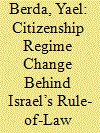

|
|
|
|
|
| Summary/Abstract |
This article delineates the relations between the judicial overhaul launched by Israel’s right-wing government in 2023 and the mechanisms of Israel’s control over Palestinians, demonstrating that they are two parts of a regime change. The essay traces a series of changes in Israel’s citizenship regime the past decade: the enactment of an anti-terrorism law and a nation-state law that defined the exclusive right of Jews to self-determination in Israel; the domestic application of surveillance and control practices developed in the occupied territories; and finally legislation allowing the revocation of Palestinians’ citizenship and the de facto annexation of the occupied territories.
|
|
|
|
|
|
|
|
|
|
|
|
|
|
|
|
| 6 |
ID:
103229
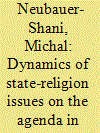

|
|
|
|
|
| Publication |
2011.
|
| Summary/Abstract |
The continuous threat to the existence of the state of Israel is reflected in a rigid agenda, causing extremely stiff competition for attention. Nevertheless, the question of the relationship between state and religion manages to be placed high on the agenda. By focusing on the case study of euthanasia during the 14th Knesset headed by Benjamin Netanyahu and the 15th Knesset headed by Ehud Barak, this article proposes an explanation that is applicable to Israel's socio-political context regarding the positioning of issues concerning state and religion on the policy-makers' agenda.
|
|
|
|
|
|
|
|
|
|
|
|
|
|
|
|
| 7 |
ID:
187566
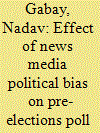

|
|
|
|
|
| Summary/Abstract |
Research has had very little to say about whether polling predictions of elections outcomes are biased in line with the political bias of the news outlets that commission the polls. This article examines the relationship between news media political bias and bias in the published results of media-sponsored pre-elections polls in the three Israeli elections that took place in 2019–20. Given that these elections were largely referenda on Benjamin Netanyahu’s corruption charges – dividing the political system, the media, and the Israeli public into pro-Netanyahu and anti-Netanyahu camps – media political biases are narrowly defined in accordance with news outlets’ general attitudes to the charges. Thus, polling bias is defined as a systematic overestimate or underestimate of the number of parliamentary seats that the bloc of pro-Netanyahu parties will actually receive. It is found that, on average, polls commissioned by anti-Netanyahu media consistently underestimated the number of seats that the pro-Netanyahu bloc would win.
|
|
|
|
|
|
|
|
|
|
|
|
|
|
|
|
| 8 |
ID:
160485
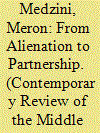

|
|
|
|
|
| Summary/Abstract |
The relations between Japan and Israel, established in 1952, can be divided into two periods. The first between 1952 and 1989 was known as the “the forty wasted years.” They were marked by chill bordering on alienation. The second began in the late 1980s and saw the flourishing of ties. Today, Japan–Israel relations are marked by much warmth and friendship at many levels. What were the causes for the Japanese policy in the early years and what factors led to the drastic change that occurred since then?
|
|
|
|
|
|
|
|
|
|
|
|
|
|
|
|
| 9 |
ID:
165287
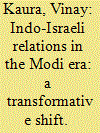

|
|
|
|
|
| Summary/Abstract |
India’s West Asia policy is being constantly reshaped under the tutelage of Indian Prime Minister Narendra Modi, whose Israel visit in July 2017 represents a momentous milestone in the Indo-Israeli relationship. The first ever visit of an Indian prime minister to the Jewish state unambiguously underscores that New Delhi under Modi is confident enough to deal with Israel as it deals with any other state in the volatile West Asian region without being concerned about third parties. Modi has been unequivocal in showing the importance India accords to its ties with Israel.
|
|
|
|
|
|
|
|
|
|
|
|
|
|
|
|
| 10 |
ID:
185267
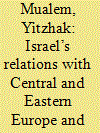

|
|
|
|
|
| Summary/Abstract |
This article examines the role of Jewish Diaspora considerations in Prime Minister Benjamin Netanyahu’s policy towards the states of Central and Eastern Europe. Israel has traditionally sought to attain both its state-centred national goals and those of the Jewish Diaspora. Under the Netanyahu governments (2009–21) a major change took place whereby the Diaspora’s existence was viewed as dependent on Israel’s continued survival and success; hence only a strong Israel can help the Diaspora. The security and wellbeing of the Jewish Diaspora thus remains a central Israeli goal, but it is to be pursued via Israel’s strengthening on the one hand, and the deepening of Jewish identity and awareness among Diaspora Jews, on the other.
|
|
|
|
|
|
|
|
|
|
|
|
|
|
|
|
| 11 |
ID:
129881


|
|
|
| 12 |
ID:
110153
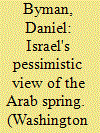

|
|
|
| 13 |
ID:
116614


|
|
|
|
|
| Publication |
2012.
|
| Summary/Abstract |
The endgame in the decade-long global confrontation over Iran's nuclear program is arriving. If the Islamic Republic and the P5+1 (China, France, Russia, the United Kingdom, and United States as well as Germany) fail to achieve agreement soon after the U.S. elections in November 2012, a military confrontation between Iran and Israel, and conceivably the United States, may soon materialize. According to recent statements by Israeli Prime Minister Benjamin Netanyahu, if further talks do not produce concrete results by the spring of 2013, Jerusalem will face the decision of whether to exercise a military strike in order to stall the Iranians or to pivot to a containment strategy vis-à-vis Tehran.1 This will, in turn, force Washington to decide whether to approve a military option by Israel, prevent it, or attack Iran itself.
|
|
|
|
|
|
|
|
|
|
|
|
|
|
|
|
| 14 |
ID:
182891
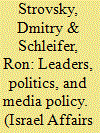

|
|
|
|
|
| Summary/Abstract |
The Russian media frequently wrote about Israeli Prime Minister Benjamin Netanyahu (1996–99, 2009–21), analysing his role in Middle Eastern affairs, especially with regard to Palestinian-Israeli relations, the Syrian civil war, and the Iranian nuclear programme. Examining Netanyahu’s image in the Russian press is crucial not only for understanding the political priorities of twenty-first-century Russian media but also for investigating Moscow’s role in international politics given its keen interest in the Middle East.
|
|
|
|
|
|
|
|
|
|
|
|
|
|
|
|
| 15 |
ID:
128057


|
|
|
|
|
| Publication |
2013.
|
| Summary/Abstract |
Israel's 2013 Knesset elections, in which the incumbent ruling party was returned to power for the first time in a quarter-century, were noteworthy in several respects. The basic divisions of Israeli politics into geopolitical and socioeconomic blocs were unchanged, only small electoral shifts being registered. On the other hand, as this article shows, Prime Minister Benjamin Netanyahu barely achieved an electoral victory despite his overwhelming preponderance in public-opinion polls. Due to the rise of the new, personality-driven Yesh 'Atid party and the latter's unlikely alliance with the settler-based Jewish Home, which together garnered as many Knesset seats as the winning Likud-Yisrael Beitenu list, for the first time in decades Ultra-Orthodox parties were excluded from the winning governing coalitions for the first time in decades. The elections were marked by the near-invisibility of the Palestinian issue and Palestinian citizens of Israel. The article concludes that the continuing governing consensus in favor of "liberal colonialism" is unsustainable, although exploiting the "cracks" in that consensus is difficult and unlikely in the short term.
|
|
|
|
|
|
|
|
|
|
|
|
|
|
|
|
| 16 |
ID:
108526
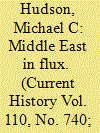

|
|
|
| 17 |
ID:
190985
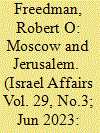

|
|
|
|
|
| Summary/Abstract |
Relations between Moscow and Jerusalem have seen numerous ups and downs since the birth of Israel in 1948. Two main issues have dominated the relationship. The first is security, with the Soviet Union, then the Russian Federation providing diplomatic support and military aid to Israel’s enemies, especially, in recent years, to Iran and Syria. The second issue is the freedom of Jewish emigration to Israel. Finally, since the advent of Vladimir Putin, Israel has been very much the junior partner in the relationship giving Russia much more than it has received in return.
|
|
|
|
|
|
|
|
|
|
|
|
|
|
|
|
| 18 |
ID:
104204


|
|
|
| 19 |
ID:
106386
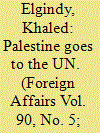

|
|
|
|
|
| Publication |
2011.
|
| Summary/Abstract |
The Palestinian plan to ask the UN for statehood in September has provoked intense anxiety in Jerusalem and Washington. But the move is less provocative than commonly thought. Palestinian leaders are not aiming at short-circuiting the peace process; they are trying to level the playing field in order to promote future negotiations with Israel and the United States.
|
|
|
|
|
|
|
|
|
|
|
|
|
|
|
|
| 20 |
ID:
185262
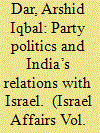

|
|
|
|
|
| Summary/Abstract |
Indian–Israeli relations have been experiencing a ‘historic moment’ since the advent of BJP as a dominant political party in India. Owing to its open embrace of Israel, the Modi-led BJP has become the most pro-Israel government in Indian history. However, contrary to the common attribution of this momentous shift to the ‘Modi factor’, New Delhi’s relations with Israel have been shaped – and continue to be determined – by the ideologies and party positions of the country’s two largest political parties – BJP and Congress.
|
|
|
|
|
|
|
|
|
|
|
|
|
|
|
|
|
|
|
|
|